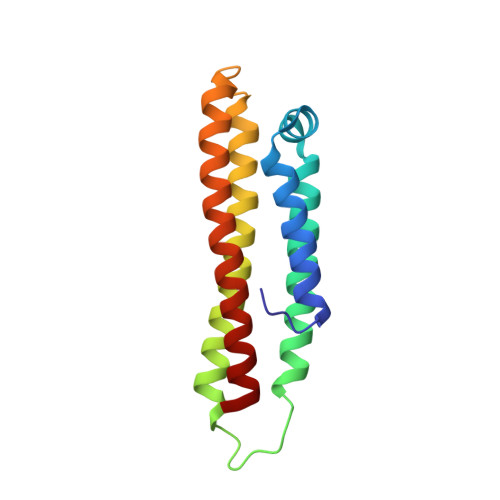Adaptation-proof SARS-CoV-2 vaccine design.
Vishweshwaraiah, Y.L., Hnath, B., Rackley, B., Wang, J., Gontu, A., Chandler, M., Afonin, K.A., Kuchipudi, S.V., Christensen, N., Yennawar, N.H., Dokholyan, N.V.(2022) Adv Funct Mater 32
- PubMed: 36590650
- DOI: https://doi.org/10.1002/adfm.202206055
- Primary Citation of Related Structures:
7UVJ - PubMed Abstract:
Severe acute respiratory syndrome coronavirus 2 (SARS-CoV-2) surface spike glycoprotein - a major antibody target - is critical for virus entry via engagement of human angiotensin-converting enzyme 2 (ACE2) receptor. Despite successes with existing vaccines and therapies that primarily target the receptor binding domain (RBD) of the spike protein, the susceptibility of RBD to mutations provides escape routes for the SARS-CoV-2 from neutralizing antibodies. On the other hand, structural conservation in the spike protein can be targeted to reduce escape mutations and achieve broad protection. Here, we designed candidate stable immunogens that mimic surface features of selected conserved regions of spike protein through 'epitope grafting,' in which we present the target epitope topology on diverse heterologous scaffolds that can structurally accommodate the spike epitopes. Structural characterization of the epitope-scaffolds showed stark agreement with our computational models and target epitopes. The sera from mice immunized with engineered designs display epitope-scaffolds and spike binding activity. We also demonstrated the utility of the designed epitope-scaffolds in diagnostic applications. Taken all together, our study provides important methodology for targeting the conserved, non-RBD structural motifs of spike protein for SARS-CoV-2 epitope vaccine design and demonstrates the potential utility of 'epitope grafting' in rational vaccine design.
- Department of Pharmacology, Penn State College of Medicine, Hershey, PA, 17033-0850, USA.
Organizational Affiliation:



















